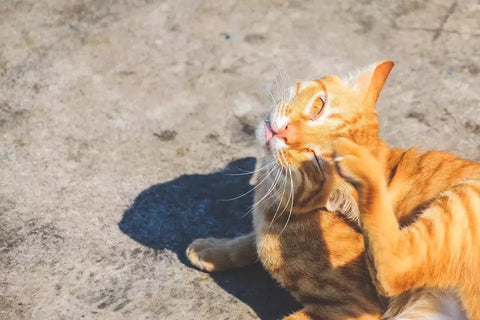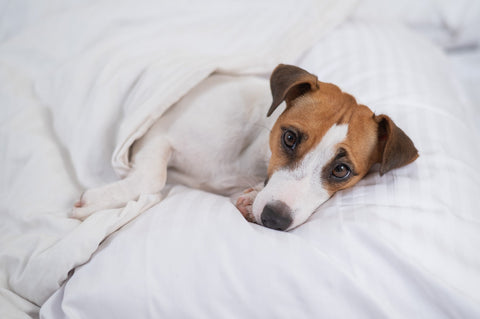Are you wondering, “why does my cat keep sneezing?” A sneezing cat is admittedly adorable. But cat sneezing can also be a cause of concern. Just like us, cats also suffer from colds and respiratory infections. However, there are also other illnesses and conditions that keep your cat sneezing a lot. So, if you’re asking, “Why is my cat sneezing?” learn the frequent causes of cat sneezing.
Why Do Cats Sneeze?
A cat sneezing a lot can be brought about by an underlying illness or infection. It may be cause for concern if your cat is sneezing frequently and you have also noticed a discharge from the eyes or nose, as well as a lack of activity and appetite.
Sneezing coupled with additional symptoms may indicate an upper respiratory infection or some underlying disease that may need veterinary attention. Your veterinarian may suspect different reasons for your cat's excessive sneezing based on an examination of their symptoms.
"Why is my cat sneezing? It’s possible that your cat has an upper respiratory infection if they keep sneezing."
Why Does My Cat Keep Sneezing?
A cat sneezing a lot could be caused by a variety of reasons. To answer the question, “why is my cat sneezing,” you must figure out the exact cause.
Viral, Bacterial, or Fungal Infections
Why is my cat sneezing? It’s possible that your cat has an upper respiratory infection if they keep sneezing. Much like human colds, upper respiratory infections are more prevalent in young cats, specifically from animal shelters. Early and thorough vaccinations can help prevent many of these diseases.
- Feline herpes virus. Herpes is transmitted to cats through contact with other infected cats. Stress can result in a flare-up and transmission. The goal of treatment is to manage the cat’s symptoms. The feline herpes virus is not communicable to people.
- Feline calicivirus. Cats are quite susceptible to contracting this virus. The most typical concern is mouth ulcers, but it can also harm the respiratory system and potentially result in pneumonia.
These illnesses may increase your cat's risk of getting other respiratory issues, which might worsen the sneezing. For instance, a cat with herpes can also get a bacterial infection, so the cat keeps sneezing.
Additionally, Pets WebMD, there are other infections that may cause your cat to keep sneezing. The following include:

- Feline infectious peritonitis may initially cause little to no symptoms or symptoms that gradually get worse.
- A cat's immune system is severely impacted by the Feline Immunodeficiency Virus (FIV) which slowly worsens, making your furbaby susceptible to additional infections.
- Feline leukemia
- Chlamydia, which frequently causes an infection of the eyes
Irritants or Allergens
The infrequent sneezes of your cat are probably nothing to worry about. They could be the result of something in the air upsetting their nasal tract. Look for patterns if it occurs frequently. Does it occur at the same time of day? Does it happen in a specific place in your home or only when there are visitors? After they leave their litter box? If you look for patterns, you can tell if your cat’s sneezing is because of an allergen.
Examples of possible irritants or allergens (substances that trigger allergic reactions) in cats include the following:
- Dust
- Pollen
- Mold
- Grass
- Fungi
- Cigarette smoke
- Vehicle smoke
- Perfume
- Cat litter, particularly kinds that produce dust
- Household cleaning products
- Scented Candles
In cats, allergies are a less common cause of sneezing than in humans. If sneezing is related to allergies, sometimes itchy skin is also present.

If your cat is struggling with allergies, it is a good idea to use Pet WiPees™ Cat All Purpose wipes regularly. These targeted cat wipes will help to remove environmental irritants from your cat and build a healthy barrier on the skin. Made with vet-approved, pet safe scents and ph balanced for sensitive cat skin, these cat wipes are safe for every day use and act as supplements for the skin.
According to PetMD, there is no real test for diagnosing an inflammatory condition as the sole cause of sneezing in cats (short of a nasal biopsy, which must be done under anesthesia). So, typically, once the other causes are ruled out, inflammation is the assumed cause.
Reportedly effective treatments range from steroids and nonsteroidal anti-inflammatory drugs (NSAIDs) to drugs typically used for nausea. Although in its infancy, there is evidence to suggest that immunotherapy could help sneezing cats in certain cases.
Foreign Materials
Inhalation of foreign materials, like blades of grass, foxtails, etc., can of course cause irritation to the nasal passages. When inhaled by a cat, the body’s response is to sneeze to expel the foreign debris. While this approach might work for smaller particles like dust, larger objects are difficult for a cat to remove by sneezing.
These situations can be diagnosed with either rhinoscopy, in which a camera is inserted into the nose of an anesthetized cat. An alternate is a nasal flush, in which sterile saline is forced through the nasal passages (under anesthesia) to remove material that the cat was unable to sneeze away.
Dental Disease
Many pet parents are surprised to hear that dental disease could contribute to cat sneezing a lot. The roots of the teeth on the upper jaw are located next to the nasal passages. With tooth infections or severe inflammation, the barrier between the tooth socket and the nose can be penetrated. When the cat eats, food can enter the nose, triggering the sneeze reflex.
Treating the dental disease, either by tooth extraction or closure of the abnormal hole, will typically alleviate the sneezing unless the issue has progressed to the feedback loop of chronic rhinitis. This condition is generally painful, so if you suspect dental disease in your cat, a veterinary visit is a must.
Neoplasia (Tumors)
As with most symptoms, tumors are on the list of possible causes of cat sneezing. In older cats especially, tumors can grow inside the nasal passage, creating irritation and inflammation that causes the cat to sneeze. These tumors are typically detected visually via rhinoscopy or a nasal biopsy and are thought to be painful.
Other Potential Causes of Cats Sneezing
A variety of other factors may cause sneezing in cats. For example, cats may experience sneezing within four to seven days of receiving an intranasal vaccine. This sneezing should lasts no more than a few days. Cats may also sneeze to try to dislodge a blockage in their nasal passages. An infection or inflammation of a tooth root may cause drainage into the sinuses and may also cause sneezing. In very rare cases, sneezing in cats can be a sign of cancer.
When to See the Vet for Cat Sneezing
For a cat that sneezes only once in a while, has no other symptoms, or has only mild symptoms, you may want to simply monitor them for a few days. Keep your cat indoors and watch for changes. But, call the vet if your cat sneezes continuously or often, sneezes blood, or has other signs such as those listed above. They may be signs of an illness or condition that needs veterinary care.
Treatment depends on the cause of the sneezing. In mild cases, the vet may suggest taking steps to simply help your cat be more comfortable -- like using a humidifier. In other cases, antibiotics, antihistamines, steroids, or fluids may be needed. Rarely, cats that don’t respond to medical therapy may require surgery.
Since many conditions associated with a cat that keeps sneezing are uncomfortable, it’s never a bad idea to take your cat to the vet as soon as you notice a problem, even if sneezing is the only symptom. These signs are certainly serious and require a vet visit immediately:
- Loss of appetite
- Weight loss
- Nasal discharge
- Worsening of symptoms
- Persistence of symptoms beyond a few days
How Do Vets Determine What Causes Cats to Sneeze?
Unfortunately, testing for bacteria or a virus cannot determine the cause. The nasal cavity is not a sterile location. So, a culture that is positive for certain bacteria does not prove that the bacteria are the primary cause of the sneeze, or even that they are causing disease (there are normal bacteria that live on the surface of the skin). Testing positive for viruses also cannot confirm the underlying cause, since even asymptomatic cats will often test positive for either herpesvirus or calicivirus.
Physical Exam
Your vet may want to first run some baseline tests to evaluate the overall health of your cat. A dental exam should be a part of the physical exam to investigate whether dental disease may be causing the sneezing.
Imaging
Imaging can be useful to look for underlying causes and evaluate the degree of damage inside the nose in severe cases.
Your veterinarian can take X-rays of your cat’s head and chest. But, the gold standard for imaging sneezing cats is a computerized tomography scan, which requires general anesthesia and is typically done in emergency or referral hospitals.
Rhinoscopy
Rhinoscopy, in which a camera is inserted into the nasal passages of an anesthetized cat, can be used to search for tumors or fungal plaques.
Biopsy
Biopsies of the walls of the nasal cavity may be taken during a rhinoscopy to search for inflammatory, fungal, and cancerous causes of sneezing.
Nasal Lavage
Flushing the nasal passages while the cat is under anesthesia can sometimes reveal diagnostic information (e.g., dislodging a foreign body), and it is also a treatment.
How Do You Treat a Sneezing Cat?
Treatment for cat sneezing a lot is targeted at the underlying cause. While a wide variety of treatments are available, you should be aware that the goal in most cases, especially chronic cases, is to reduce the frequency and severity of symptoms, not to cure them.
More research is needed to fully understand the role that infections play in cat sneezing. But repeated or prolonged courses of antibiotics have proved to be effective in controlling clinical signs. Consult with your vet to find the best treatment plan for your cat’s sneezing.









